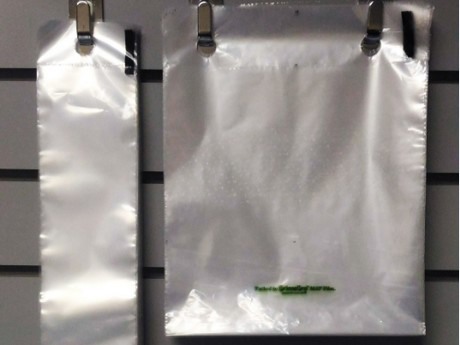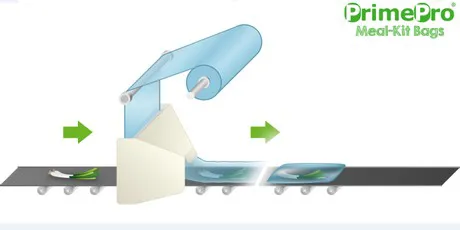Packaging that extends shelf life is often used during transit to maintain product freshness as well as help keep temperatures and ripening to preferred levels. A Canadian company has recently introduced similar technology for the packaging of meal kits. Called PrimePro, the product from Chantler Packages promises to maintain the same level of freshness as seen in larger-scale shipments, but for meal kits.
"PrimePro meal-kit bags are shelf-life extension packaging in small formats," explained Ryan Talag of Chantler Packages. "The packaging is made with a proprietary ingredient that absorbs ethylene from its environment, helping produce stay better quality for longer. Also, it is micro-perforated to reduce condensation throughout the changing temperatures of packing, delivery, and storage."
The company began with green onions in Canada in April this year, and since the launch have now expanded into other products as well as the US market. "Since launching PrimePro Meal-Kit bags in April 2018, we’ve expanded the format sizes," Talag said. "After starting in Canada, we’re now distributing to meal-kit companies in the United States. We’re looking to add distributors of these products in the U.S. and Europe where the meal-kit industry is also significantly massive."
Produce items and format sizes
Although PrimePro was first used with green onions, Talag said it can be used for a variety of produce items such as leafy greens, herbs, basil, cilantro, parsley, arugula, lettuce, peppers, tomatoes, green beans, and berries. He said there are more possibilities and the company hopes that meal kit providers will now be more confident to use additional ingredients.

"We hope the effectiveness of PrimePro encourages the meal-kit companies to eventually expand their ingredients," said Chantler Packages' Grant Ferguson. "With this shelf-life extension technology, the chefs can choose new commodities they couldn’t use before. They could also pack different things together, like tomatoes and herbs, without worrying about them spoiling. Additionally, it continues to work after consumers transfer the box contents into their fridge and expose them to ethylene from other produce items. Since there are multiple meals in each delivery, the user usually stores the ingredients in their fridge for up to a week. PrimePro is crucial in reducing yellowing, browning, loss of pressure or water, and bad taste."
The size options for the packaging include: 8 x 8′′, 10 x 10′′, 3 x 14′′, 4 x 12′′, or 5 x 15′′ although Ferguson also mentioned they are customizable. He said the bags can be used interchangeably and that companies using the bags will not have to invest in any special equipment. "While the sizes change, the material stays the same. The big competitive advantage of PrimePro is that the same bag material can be used across different produce items which provides freedom of choice for ingredients and low inventory requirements. Additionally, there is no chance of using the wrong bag or not having the bag for the produce that the client wants to pack at any given time."
"Using PrimePro doesn’t require special equipment," he continued. "The product simply goes in the PrimePro bag and there is no gassing, tying, or sealing required. It is micro-perforated to reduce condensation build up and possible bacteria growth and it can also be used as form-fill-and-seal rollstock."
Chantler says there is growth in meal kit category
According to Chantler Packages, the meal kit category began in Europe in 2007 and has since grown and spread across the Atlantic and other places. More companies are producing meal kits in both Canada and the United States. This was one of the factors that encouraged the company to produce a product designed just for the meal kit category.

"According to industry sources, the meal-kit industry size in Canada could easily grow from $120-million to $1 billion in the next five years," Talag noted. "In the U.S., the industry was already at $1 billion in 2015 and could go up to $10 billion in 2020. Currently, we are seeing meal-kits offered in more avenues than before, such as grocery stores. As people live more on-the-go lifestyles, more will decide to try the meal-kit concept. The current limitation to further growth is that consumers often find their food spoilt before they have a chance to eat it. PrimePro has been successful in keeping the produce fresh. It is evident people are willing to try meal-kits but the key is retaining subscriptions. Providing high-quality produce is the key to gaining the competitive advantage."
As a result, Chantler Packages are looking to expand PrimePro further afield. "In the past few years, Chantler Packages has added new formats of PrimePro; pallet covers, irradiation bags, and now meal-kit bags," Talag shared. "We are looking to add distributors in U.S.A. and Europe and potentially add PrimePro manufacturing to Chantler’s sister facilities around the world."
Recyclable product
Meal kits do require a fair amount of packaging, which is concerning to many consumers looking to minimize plastic use. As a response to this, companies requiring packaging for their produce but wanting to give customers a choice are looking at reducing their environmental impact. Talag said that this is what Chantler wanted to do when they designed PrimePro.
"Things need to be packaged but we can do our best to make it less wasteful," he noted. "PrimePro is 100 percent recyclable. It is made in the lowest thickness possible and uses less material than the small clamshells we see in meal-kits that hold the same commodity. It is also very light with the smallest PrimePro bag format only weighing about 1.2g."
For more information:
Ryan Talag
Chantler Packages
Tel: +1 (905) 274-2654
r.talag@chantlerpackages.com
www.chantlerpackages.com
